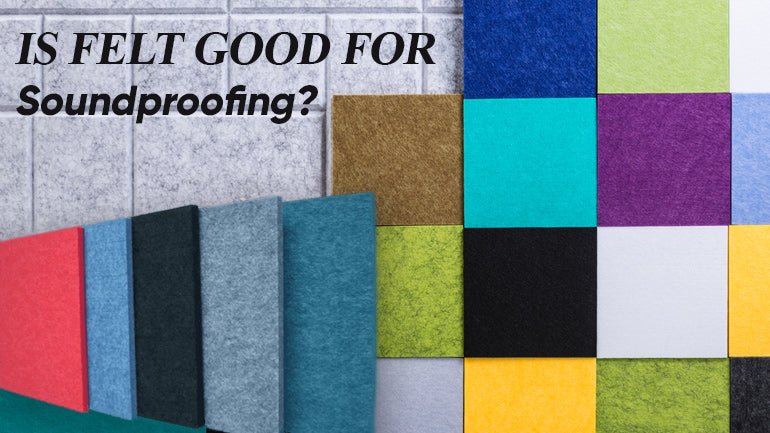Noise can cause physical and emotional stress, decreasing productivity at work. Soundproofing material is a reliable and durable material that can help you avoid the negative effects of bad noise.
Soundproofing is possible with felt. The felt fabric prevents unwanted sound waves from reaching your ears and can add comfort and aesthetic appeal to interior designs. This article will discuss felt and soundproofing.
How Felt Can Be Used as a Soundproofing Material
Acoustic or soundproofing felts are different from regular felts because Soundproofing felt is thicker and denser than standard felts. Felt can be used as a soundproofing agent.
- You can use sound insulation felt and Gypsum board together as a ceiling and wallboard.
- Felt fabric will reduce the vibration. It is attached to a wall or door panel to reduce vibration t and achieve sound insulation. It has the ability to absorb sound energy from the material. This results in noise reduction.
- If you want the partition between the office building and the room, then the felt fabric can be the best choice. Business owners can maintain their office privacy and information by placing sound insulation felt on the wall.
Discover More: What Happens When Felt Fabric Gets Wet?
What is the difference between soundproofing and sound dampening?
Many people confuse the terms soundproofing and noise dampening. Sound dampening felt material is best to reduce vibrations in space. The material absorbs sound and prevents it from transferring to other room parts. These materials are simple to install and compliment the room.
On the other hand, sound-dampening reduces noise to create a comfortable and private space without being too loud. Different types of felt have different qualities, including synthetic, natural, and combined felts.
Is Felt Good for Soundproofing?
Soundproofing is possible with Felt. Felts have many benefits, but the polyester felt is an excellent option for soundproofing a room and can be matched with its design.
You can choose from a variety of thicknesses and densities to suit your needs. Polyester felt is a cost-effective alternative to wool and can be used for many commercial and industrial applications. IceFabrics offer polyester felt to meet your requirements.
Polyester felt is a versatile and effective material. It has many benefits, including its aesthetic flexibility and soundproofing properties. These benefits will be discussed in detail below:
Polyester Felts are Design-Friendly
Room Interior designs can be finished with polyester felt. You can incorporate them as decorative pieces into your room or office in a variety of patterns. You can transform any space with multiple colors.
Enhance Your Knowledge: Can You Put Felt Fabric in the Dryer?
Polyester Felts Offer Unique Noise-Reduction Properties
The unique properties of polyester felt reduce noise in different ways. Felt can be used to block noise from entering your walls.
Felts has Strong Acoustic Potential
Polyester felts are great for audio recording booths. They block out any sound entering and leaving the room. Are you looking to reduce noise in your office conference rooms? You might consider placing felt in highly noisy areas.
Felts are Easy to Install
Felt panels can be installed easily on your wall or ceiling. You just need to cut the felt and align it with the wall fixtures. Many felt products come in yards that will make the cutting and installation process more convenient.
Sustainable Material
As mentioned above, felts can be made from recycled material. This allows you to reduce environmental degradation and add soundproofing qualities to your home.
Read More About: What Stitch is Best for Felt?
Felts Enhance Comfort and Entertainment
Felts can improve your comfort whether you use them at work or at home. You can enjoy the benefits of felts, such as improved mental health and entertainment. Felts can be used to reduce noise levels to neighbors' music and provide high-quality sound inside your home.
Is Felt like a Good Sound Insulator?
Although open workspaces can be very useful for making the most out of modern infrastructures and stimulating communication, they can also make it quite noisy.
Noise has a significant impact on productivity. People find it difficult to work in noisy environments. Felt is perfect for maintaining a balance between silence and sound in the workplace.
Felt fabrics also can reduce noise and pollutants in the room. These are ideal for restaurants, noisy offices, and your home. Ice fabrics offer felt fabrics in different sizes and colors. You can shop to meet your artistic and aesthetic needs, regardless of whether you choose a roll or yard.
Does felt reduce vibration?
Felt fabric can effectively reduce vibrations and sounds for improved listening quality. The self-adhesive property allows for easy application on any surface, quickly and efficiently.
What makes a Material Soundproof?
You need to know the properties of an alternative soundproofing material that will suit your needs. These are the top qualities that make a material soundproof.
- Porous: The expansion, compression, and flow direction of sound energy will be altered by porous materials. Porous material will absorb sound energy, while an absorbent one will not.
- Density: A material must have a sufficient density to be soundproofed or absorbent. A high-density fabric does not allow sound to pass through it.
- Size of cells: Materials with sufficiently small cells will soundproof better than other materials. To absorb sound energy more efficiently, cells must be smaller than the sound wavelength.
Get More Info: How to Choose Pool Table Felt?
Conclusion
Felt can be used in many settings as a soundproofing material. Felt can be used in studios, concert halls, exhibition halls, galleries, and interrogation rooms. It can also be used in lecture halls, conference rooms, lecture halls, lecture halls, and gymnasiums. The material can be used as a sound-reduction material or as a design element.



